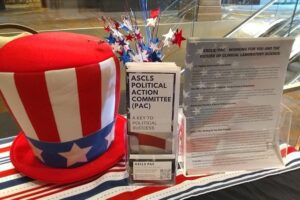Volume 35 Number 6 | December 2021
Stephanie K. Mabry, MS, MLS(ASCP)CMSCCM, ASCLS Political Action Committee Chair

ASCLS PAC is a voluntary nonprofit organization created to provide financial and educational support for the election campaigns of responsible candidates for Congress. ASCLS PAC collects donations from ASCLS members and uses those funds to make contributions to candidates for federal elected office who have been sensitive to the concerns of the clinical laboratory community. This past cycle, ASCLS PAC was able to make two key contributions, one to Senator Patty Murray (D-WA) and one to Senator Lisa Murkowski (R-AK). Senator Murray is the chair of the Senate Health Education Labor and Pensions (HELP) Committee, and Senator Murkowski is a member of the Senate HELP Committee.
When ASCLS PAC makes a contribution, it “opens the door” for our legislative consultant, Patrick Cooney, and ASCLS members to meet directly with that legislator and discuss the concerns of ASCLS and the clinical laboratory community at large. The meetings that occurred as an immediate result of these recent contributions were well-received and productive, and both senators are expected to support legislative solutions to allied health/clinical laboratory workforce shortage concerns.
This ties directly with a previous contribution ASCLS PAC made to Senator Tina Smith (D-MN). As a result of conversations with ASCLS members and staff following PAC donations, Senator Smith is expected to sponsor legislation addressing the clinical laboratory workforce shortage, and Senators Murray and Murkowski are expected to support such legislation in the Senate HELP Committee, bringing bipartisan support in a key committee for this critical issue.
As optimistic as this news is, the work is not done, and your help is still needed! Once legislation is introduced, ASCLS will need to maintain a strong, active presence in Washington to see a successful workforce shortage solution passed through both the Senate and the House. A part of a strategic approach, ASCLS PAC needs a strong “war chest” so that contributions can be made, meetings can be scheduled, and minds can be convinced when opportunities present themselves. PAC dollars don’t “buy votes,” but they do provide the important opportunity to discuss the merits of our legislation.
We know the concerns of the clinical laboratory community are worthwhile and convincing. Without the opportunity to share the merits of these concerns, however, they will go unheard. Don’t let our momentum be slowed, nor our voice and vision be stifled during this key time in the legislative history of ASCLS. Whether you are a longstanding donor or a first-time donor, please, visit www.asclspac.square.site and make a contribution today. Our legislative success depends on it.
Stephanie Mabry is a Visiting Instructor in the Clinical and Diagnostic Sciences Department at Oakland University in Rochester, Michigan.
The ASCLS Political Action Committee collects donations from ASCLS members and uses those funds to make contributions to candidates for federal elected office who have been sensitive to the concerns of the clinical laboratory community.
“Once legislation is introduced, ASCLS will need to maintain a strong, active presence in Washington to see a successful workforce shortage solution passed through both the Senate and the House.”
